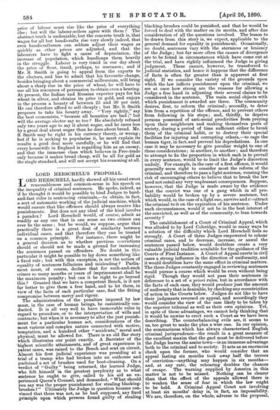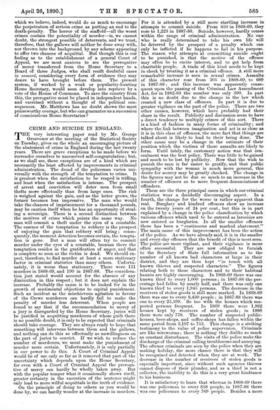LORD HERSCHELL'S PROPOSAL.
T4OEDHERSCHELL hardly showed all his usual sweet reasonableness and common-sense in his speech on the inequality of criminal sentences. He spoke, indeed, as if he thought it would be possible to bind Judges to hard- and-fast rules in sentencing criminals,—to obtain, in fact, a sort of automatic working of the judicial machine, which would ensure that like offences should always receive like punishments. But does not any ideal of the kind involve a paradox ? Lord Herschel would, of course, admit as readily as any one that in one sense no two crimes can ever be the same ; but he would, we suppose, argue that practically there is a great deal of similarity between individual cases, and that therefore they can be treated on a common principle. For instance, there might be a general decision as to whether previous convictions should or should not be made a ground for increasing the sentences passed on offenders. No doubt in this particular it might be possible to lay down something like a fixed rule ; but with this exception, is not the notion of equality of sentences fallacious and misleading ? Parlia- ment must, of course, declare that for such-and-such crimes so many months or years of imprisonment shall be the maximum penalty ; but can it be right to go beyond this ? Granted that we have a competent Bench, is it not far better to give them a free hand, and to let them, in view of the facts of each particular case, find the fitting compromise between mercy and rigour. The administration of the penalties imposed by law must, in the case of human beings, be casuistically con- ducted. It is all very well to have immovable rules in regard to procedure, or to the interpretation of wills and contracts ; but when it is necessary to allot the just punish- ment for a particular human act, considerations of the most various and complex nature connected with motive, temptation, and a hundred other "accidents," moral and physical, must be allowed for. There is an old Bar story which illustrates our point exactly. A Barrister of the -highest scientific attainments, and of great experience in patent cases, was raised. to the Bench and sent on circuit. Almost his first judicial experience was presiding at a trial of a tramp who had broken into an outhouse and purloined a set of brushes used for boot-cleaning. On a verdict of " Guilty " being returned, the learned Judge, who felt himself in the greatest perplexity as to what sentence he ought to give, called to his aid an ex- perienced. Queen's Counsel, and demanded, "What should you say was the proper punishment for stealing blacking- brushes ?" Ultimately the Judge in question became con- vinced that there was not, as he had supposed, any fixed principle upon which persons found guilty of stealing blacking-brushes could be punished, and that he would be forced to deal with the matter on its merits, and after due consideration of all the questions involved. The lesson to be drawn from this story is, we expect, applicable to the general demand for equality in punishment. Occasionally, no doubt, sentences vary with the sternness or leniency of the Judge ; but far more often the causes of divergence are to be found in circumstances which have come out at the trial, and. have rightly influenced the Judge in giving judgment. These cannot, however, be transferred to judicial statistics, and hence it happens that the difference of facts is often far greater than is apparent at first sight. If we consider the variety of the grounds upon which the law inflicts punishment upon the criminal, we see at once how strong are the reasons for allowing a Judge a free hand in adjusting their several claims to be considered in the sentence. The main social objects with which punishment is awarded are three. The community desires, first, to reform the criminal; secondly, to deter him from a repetition of the offence, and to prevent others from following in his steps; and, thirdly, to deprive persons possessed of anti-social proclivities from preying upon their neighbours and making themselves pests of society, during a period of time sufficient either to break them of the criminal habit, or to destroy their special facilities for injuring and corrupting others,—to cage the human tiger, in fact, and prevent his depredations. In one case it may be necessary to give peculiar weight to one of these considerations ; in another, to another ; and therefore to attempt to fix the proportion in which each is to prevail in every sentence, would be to limit the Judge's discretion unduly. For example, in the case of a first offence, it would generally seem right to consider most the reform of the criminal, and therefore to pass a light sentence, running the risk of encouraging others to believe that to break the law need not entail any very unpleasant consequences. Suppose, however, that the Judge is made aware by the evidence that the convict was one of a gang which in all pro- bability would be broken up by a severe sentence, but which would, in the case of a light one, survive and rc-attract the criminal to it on the expiration of his sentence. Under such circumstances, would it not be in the best interest of the convicted, as well as of the community, to lean towards severity ?
The establishment of a Court of Criminal Appeal, which was alluded to by Lord Coleridge, would in many ways be a solution of the difficulty which Lord Herschell feels so strongly. A Court of three Judges empowered to rehear criminal cases, and to decrease, increase, or annul the sentences passed below, would doubtless create a very valuable judicial tradition available for the guidance of the Courts of First Instance. A Court of Appeal exerts in civil cases a strong influence in the direction of uniformity, and it would doubtless have the same effect in criminal matters. The three Judges constantly engaged in reviewing sentences would pursue a course which would be even without being rigid. Though they would not pass their sentences in deference to a set of a priori rules, but in accordance with the facts of each case, they would. produce just the amount of uniformity that is desirable, by checking any eccentricities of action in the Courts below. Judges do not like to have their judgments reversed on appeal, and accordingly they would consider the view of the case likely to be taken by the superior tribunal as well as their own opinions. Yet, in spite of these advantages, we cannot help thinking that it would be unwise to erect such a Court as we have been describing. The counterbalancing evils are, it seems to us, too great to make the plan a wise one. In our opinion, the summariness which has always characterised English criminal jurisprudence—the result in a great measure of the excellent maxim that the gaol must be delivered before the Judge leaves the assize town—is an immense advantage both to the criminal and to society. It acts as an enormous check upon the former, who would consider that an appeal lasting six months took away half the terrors of conviction—anything may happen in six months— and, at any rate, the rehearing doubles the chances of escape. The warning supplied by America in this matter is not to be missed. Nothing can be clearer than that the effect of the appeals allowed there is to weaken the sense of fear in which the law ought to be held. A Criminal Appeal Court not involving at least six months' delay is, in fact, an impossibility. We are, therefore, on the whole, adverse to the proposal, which we believe, indeed, would do as much to encourage the perpetration of serious crime as putting an end to the death-penalty. The horror of the scaffold—all the worst crimes contain the potentiality of murder—is, we cannot doubt, the strongest possible of deterrents, and we trust, therefore, that the gallows will neither be done away with, nor thrown into the background by any scheme appearing to offer two chances of acquittal. But though this is our feeling as to the establishment of a general Court of Appeal, we are most anxious to see the prerogative of mercy transferred from the Home Secretary to a Board of three Judges, who shall resift doubtful cases in camerd, considering every form of evidence they may desire to have brought before them. The present system, if worked by a weak or popularity-hunting Home Secretary, would soon develop into reprieve by a vote of the House of Commons. To save the country from this, the prerogative must be placed in independent hands, and exercised without a thought of the political con- sequences. Mr. Matthews has no doubt shown the most praiseworthy courage, but who can guarantee us a succession of conscientious Home Secretaries ?



































 Previous page
Previous page